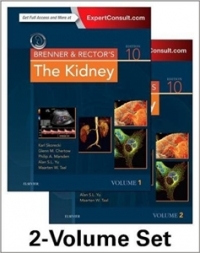Overcome the toughest clinical challenges in nephrology with Brenner & Rector’s The Kidney the most well-known
nephrology resource in the world. A diverse team of more than 200 international contributors brings you the latest
knowledge and best practices on every front in nephrology worldwide. From basic science and pathophysiology to clinical
best practices, Brenner & Rector’s The Kidney is your go-to resource for any stage of your career.
New to This Edition
Internationally diverse, trusted guidance and perspectives from a team of well-respected global contributors. An
editorial team headed by Dr. Skorecki and handpicked by Dr. Brenner ensures the ongoing adherence to previous standards
of excellence. All chapters have been extensively d or entirely rewritten by authorities in their respective fields.
The latest clinical information including recent clinical trials, genetic causes of kidney disease, cardiovascular and
renal risk prediction in chronic kidney disease, new paradigms in fluid and electrolyte management, and pediatric
kidney disease, keep you current with the rapid development of care and research worldwide.
Expert Consult eBook version included with purchase. This enhanced eBook experience allows you to search all of the
text, figures, and references from the book on a variety of devices.
Key Features
Review of the basic science that underpins clinical nephrology, comprehensive ion of the most important bibliographical
sources in nephrology, and Board Review-style questions help you prepare for certification or recertification.
Coverage of kidney health and disease from pre-conception through fetal and infant health, childhood, adulthood, and
into old age. Expanded sections and chapter on global perspective and ethical considerations.
Uniform terminology and nomenclature in line with emerging consensus in world kidney community.
More than 700 full-color high-quality photographs as well as carefully chosen figures, algorithms, and s to illustrate
essential concepts, nuances of clinical presentation and technique, and decision making provide a visual grasp and
better understanding of critical information.
Section I: Normal Structure and Function
1 Embryology of the Kidney
2 Anatomy of the Kidney
3 The Renal Circulations and Glomerular Ultrafiltration
4 The Podocyte
5 Metabolic Basis of Solute Transport
6 Transport of Sodium, Chloride, and Potassium
7 The Regulation of Calcium, Magnesium, and Phosphate Excretion by the Kidney
8 Renal Handling of Organic Solutes
9 Renal Acidification Mechanisms
10 Urine Concentration and Dilution
11 The Cell Biology of Vasopressin Action
12 Aldosterone and Mineralocorticoid Receptors: Renal and Extrarenal Roles
13 Vasoactive Molecules and the Kidney
14 Arachidonic Acid Metabolites and the Kidney
Section II: Disorders of Body Fluid Volume and Composition
15 Disorders of Sodium Balance
16 Disorders of Water Balance
17 Disorders of Acid-Base Balance
18 Disorders of Potassium Balance
19 Disorders of Calcium, Magnesium, and Phosphate Balance
Section III: Epidemiology and Risk Factors in Kidney Disease
20 Epidemiology of Kidney Disease
21 Demographics of Kidney Disease
22 Risk Factors and Chronic Kidney Disease
23 Nephron Endowment and Developmental Programming of Blood Pressure and Renal Function
24 Aging and Kidney Disease
Section IV: Evaluation of the Patient with Kidney Disease
25 Approach to the Patient with Kidney Disease
26 Laboratory Assessment of Kidney Disease: Glomerular Filtration Rate, Urinalysis, and Proteinuria
27 Interpretation of Electrolyte and Acid-Base Parameters in Blood and Urine
28 Diagnostic Kidney Imaging
29 The Kidney Biopsy
30 Biomarkers in Acute and Chronic Kidney Diseases
Section V: Disorders of Kidney Structure and Function
31 Acute Kidney Injury
32 Primary Glomerular Disease
33 Secondary Glomerular Disease
34 Overview of Therapy for Glomerular Disease
35 Microvascular and Macrovascular Diseases of the Kidney
36 Tubulointerstitial Diseases
37 Urinary Tract Infection in Adults
38 Urinary Tract Obstruction
39 Diabetic Nephropathy
40 Urolithiasis
41 Kidney Cancer
42 Onco-Nephrology: Kidney Disease in Patients with Cancer
Section VI: Genetics of Kidney Disease
43 Genetic Basis of Kidney Disease
44 Inherited Disorders of the Glomerulus
45 Inherited Disorders of the Renal Tubule
46 Cystic Diseases of the Kidney
Section VII: Hypertension and the Kidney
47 Primary and Secondary Hypertension
48 Renovascular Hypertension and Ischemic Nephropathy
49 Hypertension and Kidney Disease in Pregnancy
50 Antihypertensive Therapy
51 Diuretics
Section VIII: The Consequences of Advanced Kidney Disease
52 Adaptation to Nephron Loss and Mechanisms of Progression in Chronic Kidney Disease
53 Mechanisms and Consequences of Proteinuria
54 The Pathophysiology of Uremia
55 Chronic Kidney Disease-Mineral Bone Disorder
56 Cardiovascular Aspects of Kidney Disease
57 Hematologic Aspects of Kidney Disease
58 Endocrine Aspects of Chronic Kidney Disease
59 Neurologic Aspects of Kidney Disease
60 Dermatologic Conditions in Kidney Disease
Section IX: Conservative Management of Kidney Disease
61 Dietary Approaches to Kidney Diseases
62 A Stepped Care Approach to the Management of Chronic Kidney Disease
63 Therapeutic Approach to Chronic Kidney Disease-Mineral and Bone Disorder
64 Drug Dosing Considerations in Patients with Acute Kidney Injury and Chronic Kidney Disease
Section X: Dialysis and Extracorporeal Therapies
65 Hemodialysis
66 Peritoneal Dialysis
67 Critical Care Nephrology
68 Plasmapheresis
69 Elimination Enhancement of Poisons
70 Interventional Nephrology
Section XI: Kidney Transplantation
71 Transplantation Immunobiology
72 Clinical Management of the Adult Kidney Transplant Recipient
Section XII: Pediatric Nephrology
73 Malformation of the Kidney: Structural and Functional Consequences
74 Diseases of the Kidney and Urinary Tract in Children
75 Fluid, Electrolyte, and Acid-Base Disorders in Children
76 Renal Replacement Therapy (Dialysis and Transplantation) in Pediatric End-Stage Kidney Disease
Section XIII: Global Considerations in Kidney Disease
77 Latin America
78 Africa
79 Near and Middle East
80 Indian Subcontinent
81 The Far East
82 Oceania Region
Section XIV: Challenges in Nephrology
83 Ethical Dilemmas Facing Nephrology: Past, Present, and Future
84 Health Disparities in Nephrology
85 Care of the Older Person with Chronic Kidney Disease
86 Tissue Engineering, Stem Cells, and Cell Therapy in Nephrology
87 Quality Improvement Initiatives in Kidney Disease


